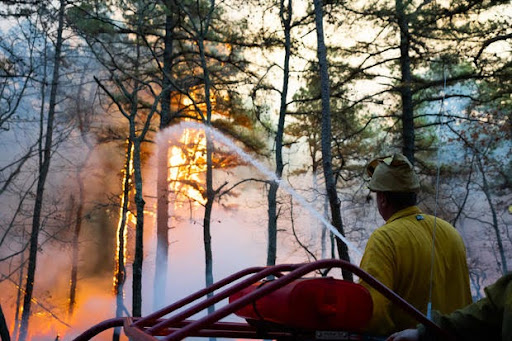This year, an unrelenting lack of rainfall has disrupted the lives of farmers, students and families from the Northeast, especially New Jersey and Pennsylvania, in various ways.
Clemson students from these drought-stricken areas have shared their experiences with The Tiger as the drought has crept into conversations both in and outside the classroom at Clemson University.
Pennsylvania native Chase Landry, a sophomore double major in finance and management, provided a firsthand perspective of the drought’s effects on his family back home.
“Pennsylvania was put under a drought watch after 40 days of no rain,” Landry told The Tiger. “My family has had to cut back on watering our garden, and my dad has been researching ways to install a rain barrel system to conserve water more effectively.”
For Landry, the drought underscores how interconnected environmental challenges are. “It’s not just about one state or one region. This impacts all of us in some way,” he said.
Stratos Chandras, a freshman political science major from northern New Jersey, also explained how the drought has affected his family.
“We’ve had to monitor water usage carefully. My parents are worried about what happens if this continues into next year,” Chandras told The Tiger, also noting that the drought has unveiled a piece of local history: An 800-year-old ghost bridge.
“It’s a structure that’s usually hidden underwater, but now, with the low rainfall, it’s fully visible. Seeing the dry riverbeds around it feels eerie, almost like nature’s way of warning us,” Chandras told The Tiger.
Up in southern New Jersey, Michael Curiale, a freshman pharmacy major at Ocean County College in Toms River, New Jersey, described how his family has coped with drought conditions.
“It’s not just about dry lawns or empty water barrels,” Curiale told The Tiger. “I witnessed a forest fire near our neighborhood. Watching those flames tear through the woods was terrifying.”
Curiale also described state-imposed restrictions that were enacted to mitigate fire hazards.
“For weeks, fire bans were in place across New Jersey. As of Nov. 21, the bans have been lifted, but the state remains under a drought warning,” he told The Tiger, also emphasizing the importance of public awareness.
“Just because we’ve had some rain doesn’t mean the problem is solved. Conditions are still critical,” he said.
Many students’ families in New Jersey and Pennsylvania are having to make adjustments to conserve water, from cutting back on watering the lawn to being more mindful of daily water use.
Steven Lee, a New Jersey cranberry farmer whose family has been cultivating the fruit since 1868, describes the uphill battle he faces with diminishing water levels during a recent interview with Fox News. He noted the uncertainty that plagues farmers during periods of drought.
“The biggest challenge is not knowing what is ahead of us,” Lee explained during the interview. “The challenge is what lessons have we learned from the previous years of business. The thing we have to focus on is how do we measure business differently to be able to protect our farm and continue to farm.”
Lee’s cranberry bogs, which rely heavily on water, are one example of statewide agricultural producers facing challenges due to the drought. Lee noted that he is currently exploring innovative irrigation techniques and finding ways to manage resources more efficiently but is also experiencing pressure to preserve both his harvest and a family legacy that spans generations.
The drought has left no corner of the Northeast untouched, from the cranberry bogs of New Jersey to the forests of Pennsylvania. While farmers like Lee are adapting their practices, students like Chandras, Curiale, Landry and their families are finding ways to adjust to a new normal.
From exploring advanced irrigation techniques to adhering to fire safety restrictions to conserving water at home, people are taking steps to mitigate the drought’s effects.









